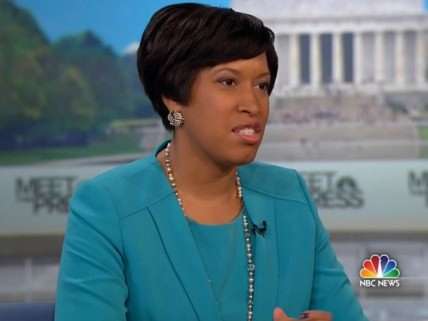D.C. Mayor Agrees That Marijuana Legalization Can Proceed Despite Anti-Drug Rider

In a Meet the Press interview on Sunday, newly elected D.C. Mayor Muriel Bowser joined D.C. congressional delegate Eleanor Holmes Norton, D.C. Council Chairman Phil Mendelson, and D.C. Attorney General Karl Racine in arguing that marijuana legalization in the nation's capital can proceed despite a spending rider that supposedly blocked it. "We want to respect the will of the D.C. voters," she told NBC's Chuck Todd. "We think Initiative 71 was self-enacting. Our legislators are going to send it up to the Congress in January."
Brian Moore, Mendelson's chief of staff, tells me the council chairman "will transmit the measure in the normal course of business," which "will likely be soon." Unless Congress enacts a resolution of disapproval within 30 legislative days of receiving the initiative (which is unlikely), it will take effect automatically, eliminating penalties for possession, sharing, and home cultivation within specified limits.
The main argument for proceeding with congressional review of the ballot measure is that the anti-drug rider in the omnibus spending bill that Congress approved last month bans the use of public funds to "enact" marijuana legalization, and Initiative 71 was enacted when voters approved it in November. That argument seems well-grounded in the language of the D.C. Home Rule Act, but it is not the only way around the rider. Walter Smith, executive director of the D.C. Appleseed Center for Law & Justice, notes that the District kept operating during the last federal government shutdown by drawing on reserve funds appropriated in earlier fiscal years. He argues that the same maneuver could be used to make doubly sure that the District is complying with the anti-drug rider, which applies only to "funds contained in this Act."
The District can say, for example, that the compensation for whatever time Mendelson spends on transmitting Initiative 71 to Congress comes from its reserves. "It's much better," Smith says, "not to simply defy Congress but to say, 'OK, we've read what you've enacted. We're going to abide by it. You told us not to spend our upcoming fiscal-year dollars on this; we won't. We'll spend our reserves.'…That way they have complete authority to implement regulations, pass further legislation if need be, and so on." Smith says that approach might even allow the D.C. Council to proceed with plans to license and regulate marijuana growers and retailers, although "that's a battle for another day."


Show Comments (7)